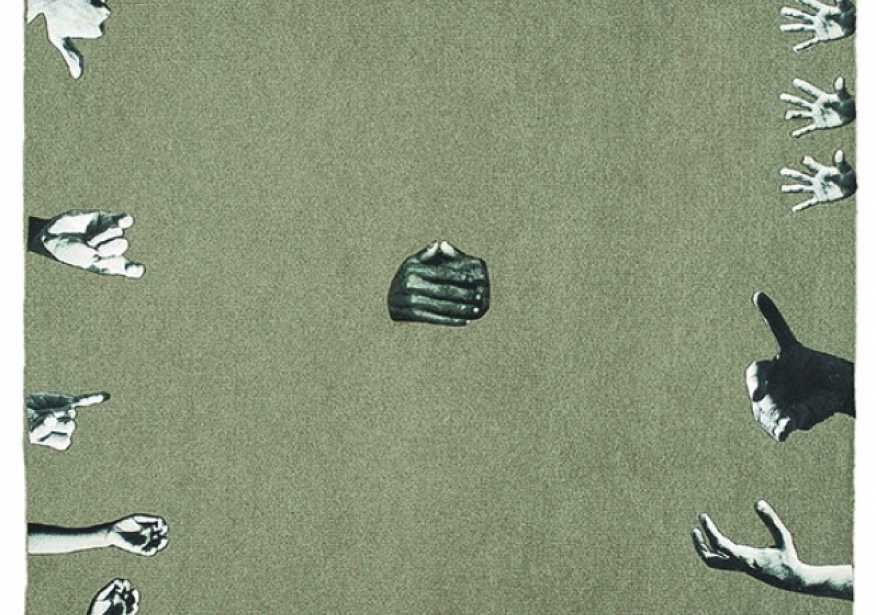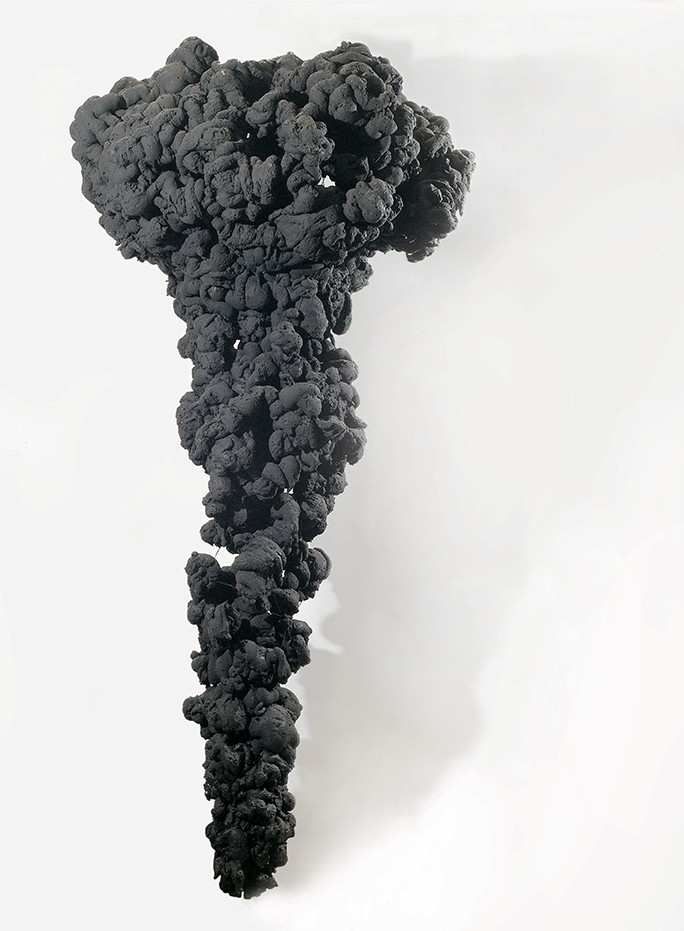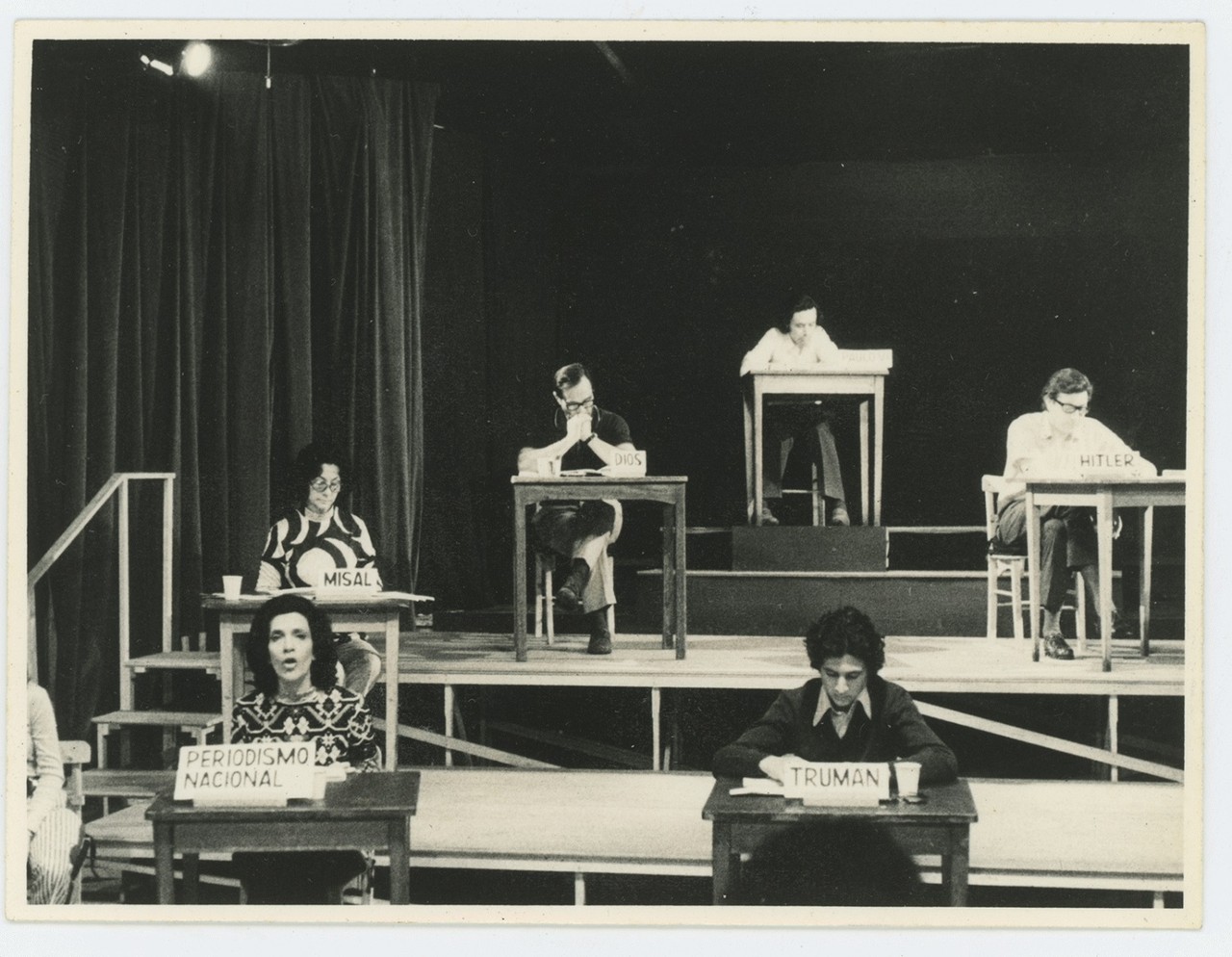León Ferrari
16 Feb - 12 Aug 2018

León Ferrari, Dios (God), 1964
Photo collage on cardboard, 18 13/16 x 12 inches
Ferrari family collection, Buenos Aires
Photo collage on cardboard, 18 13/16 x 12 inches
Ferrari family collection, Buenos Aires

León Ferrari, Hongo nuclear (negro) [Mushroom Cloud (Black)], 2004
Polyurethane foam, wire, and synthetic paint, 100 x 17 1/16 inches
Silvia and Hugo Sigman Collection, Buenos Aires
Polyurethane foam, wire, and synthetic paint, 100 x 17 1/16 inches
Silvia and Hugo Sigman Collection, Buenos Aires
LEÓN FERRARI
The Words of Others: León Ferrari and Rhetoric in Times of War
16 February – 12 August 2018
Curated by Ruth Estévez
Originally organized as part of Pacific Standard Time: LA/LA (2017–18), an initiative of the Getty Foundation, this solo exhibition of the Argentinian artist León Ferrari (b. 1920, Buenos Aires; d. 2013, Buenos Aires) focuses on his influential practice from the 1960s to the 1980s. With a particular emphasis on his literary collages—works that incorporate text excerpts from different sources that are reassembled to create an altogether new message—the exhibition features the first full live reading of his seminal 1967 publication Palabras ajenas (The Words of Others)—an important Vietnam-era anti-war piece written in the form of a dramatic script.
Palabras ajenas was Ferrari’s first literary collage, composed as an extensive dialogue among various characters, including President Lyndon B. Johnson, Adolf Hitler, Pope Paul VI, and God. By means of a cut-and-paste exercise, the work associates the atrocities of the Vietnam War, the horrors of Nazism, and the representations of redemption and punishment in religion through quotations selected from history books, literature, the Bible, newspapers, and magazines. The result is a chorus of contemporary voices that recite and interpret the text, which will be read in full in PAMM’s auditorium on February 15 from 1 to 9 pm.
Ferrari’s literary collages were a central element of his practice, yet most remain unpublished or have experienced minimal circulation as limited editions or sketchbooks. This exhibition revisits many of these works, exploring uncharted territory and offering a new perspective on Ferrari’s work while exploring the aesthetic forms of political intervention that emerged in Latin America in the 1960s. This profoundly contemporary project examines the obscenity of war, the ways the media represents conflict, and the role of political and religious discourse in the expansion of Western culture.
The Words of Others: León Ferrari and Rhetoric in Times of War
16 February – 12 August 2018
Curated by Ruth Estévez
Originally organized as part of Pacific Standard Time: LA/LA (2017–18), an initiative of the Getty Foundation, this solo exhibition of the Argentinian artist León Ferrari (b. 1920, Buenos Aires; d. 2013, Buenos Aires) focuses on his influential practice from the 1960s to the 1980s. With a particular emphasis on his literary collages—works that incorporate text excerpts from different sources that are reassembled to create an altogether new message—the exhibition features the first full live reading of his seminal 1967 publication Palabras ajenas (The Words of Others)—an important Vietnam-era anti-war piece written in the form of a dramatic script.
Palabras ajenas was Ferrari’s first literary collage, composed as an extensive dialogue among various characters, including President Lyndon B. Johnson, Adolf Hitler, Pope Paul VI, and God. By means of a cut-and-paste exercise, the work associates the atrocities of the Vietnam War, the horrors of Nazism, and the representations of redemption and punishment in religion through quotations selected from history books, literature, the Bible, newspapers, and magazines. The result is a chorus of contemporary voices that recite and interpret the text, which will be read in full in PAMM’s auditorium on February 15 from 1 to 9 pm.
Ferrari’s literary collages were a central element of his practice, yet most remain unpublished or have experienced minimal circulation as limited editions or sketchbooks. This exhibition revisits many of these works, exploring uncharted territory and offering a new perspective on Ferrari’s work while exploring the aesthetic forms of political intervention that emerged in Latin America in the 1960s. This profoundly contemporary project examines the obscenity of war, the ways the media represents conflict, and the role of political and religious discourse in the expansion of Western culture.

